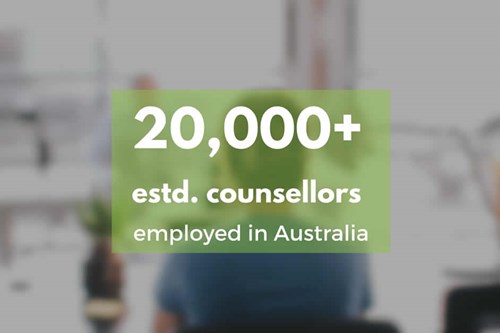Industry profile: Community services

It was Winston Churchill, one of history’s finest and wisest, that said “We make a living by what we get. We make a life by what we give.”
If that rings true for you, it’s possible that generosity, the compulsion to give and provide assistance to others, is driving your career direction. If so, you may wish to consider a career in community services. The sector encompasses a variety of roles, from counsellors and youth workers, to positions supporting the aged, disabled, and homeless. It’s tough work, but it’s also rewarding.
This week we’ll be focusing our industry profile on two of the more popular areas in the sector – counselling and youth work. Read on to learn more about what sort of income, working hours, and opportunities are likely to await if you take the plunge and invest your time in helping the less fortunate or those who are down on their luck.
What do the jobs involve?
Counsellors deal with people across a range of issues. Career counsellors, for example, assist people in discovering a professional or vocational direction while those who understand addiction and behaviour may assist people abusing drugs and alcohol. Relationship counsellors, on the other hand, specialise in mediating discussions between couples with relationship problems.
Regardless of the area, expect to have a lot of face-to-face time with people looking for someone to trust. Well-tested methods, such as cognitive behaviour therapy, are commonly used to achieve results.
Youth workers, on the other hand, typically work for welfare agencies and provide friendly, personal support to young people who are distressed, homeless, or suffering from addiction or behaviour issues. Some youth workers are engaged to work on specific projects or initiatives, like youth camps, while others are permanently employed to work in hostels and provide general assistance.

What types of people work in community services?
Community service work demands patience, compassion, and above all, high level listening and communication skills. As a counsellor your job will require you to rapidly build rapport with the people you meet and communicate strategies to deal with their issues. In other words, your soft skills need to be on point. If you’re the quiet type but still intent on a job in community services, you may be able to slot into a support role away from the frontline.
Monitoring skills, defined as the ability for you to assess both the performance of yourself and others, is also highly desirable and indicative of strong emotional intelligence and self-awareness.
Those headed into youth work will be far more physically active. Many youth orientated programs revolve around physical or practical activity rather than sit-down bookwork (for obvious reasons), so if you’re interested in this as a career we’d suggest getting into active shape. If you’re not keen to run around all day, co-ordinator roles are often available. To succeed in this area, you’ll need strong communication abilities, time and people management, and the ability to multi-task.
What are the chances of getting a job?
In November 2014 there was an estimated 19,200 counsellors in the workforce, defining the occupation as medium sized. While strong growth is forecast in percentage terms, due to the medium number of counsellors currently employed, the government is forecasting job openings to be below average with between 5,000 – 10,000 positions opening up over the next five years.
The medium number of counsellors also suggests that work may be difficult to find in regional areas.
The data pertaining to youth workers is bound up with other welfare support workers, including family support workers, residential care officers, and disability services officers, so it’s hard to find job-specific data.
Prospects for the group as a whole, however, are very strong. In November 2014 there were 49,600 people working in this category and over the next five years forecasts expect between 25,001 and 50,000 job openings. While this sounds promising, many of these openings may relate to welfare workers brought on to care for our ageing population.

81.7% of counsellors either have a graduate diploma (or graduate certificate) or a bachelor degree. That’s a huge percentage and it indicates how important additional study is for this career. Only 4.3% have Year 12 as their highest qualification.
The numbers tell a different story when we move to welfare support workers. While 32.6% have a degree, 22.2% have a Certificate III/IV as their highest level of education while 18.8% have an advanced or standard diploma. 14.7% have Years 10-12 as their highest level of education. In other words, there’s less study required compared with counselling.
How much can I earn and what are the hours like?
Earnings for counsellors are typically higher than the average across all occupations. Before-tax full-time earnings (not including superannuation contributions) are around $1,200 per week compared to the all occupation average of $1,152.
Average weekly hours worked are also lower. Full-time males can be expected to work for 41.7 hours per week, while full-time females on average work 35.4 hours. Interestingly, the latter metric is significantly smaller than the average hours worked for other female full-time occupations. That comes in at 38.2 hours.
Earnings for welfare support workers, such as youth workers, are lower, likely due to the comparatively smaller study required. Average before-tax full-time earnings come in at $1,150, which is only $2 less than the all-occupation average.
However, the hours are still good. Full-time men can expect to work 38.9 hours per week while full-time women should expect to work 35.6 hours. Both are significantly lower than their respective averages, which are 42.4 and 38.2 hours.

What should I do next if I think a career in community service is for me?
As with all career ideas, we suggest you get some basic experience first. The fantastic thing about youth work is that there’s often ample opportunity to volunteer. You’ll likely need to undergo a police check first, however.
Obviously it’s not practical to volunteer for a job as a counsellor, but if you find friends regularly confide in, take that as a positive indicator. Just be aware that expectations between friends and those you formally counsel will be significantly different.
The next step is to complete a formal qualification. This is imperative if you’re interested in counselling and highly beneficial if you wish to be a youth worker. Upskilled offers many courses you can do online. To find out more about community services courses, head here or Download our FREE 50 page Community Services Industry Profile eBook.



)
)

